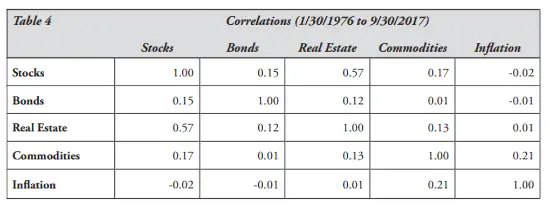Stock investors sitting on cash and watching the stock market soar to new highs shouldn’t be faulted for missing out on above-average historical returns in 2020. Inflation, along with increasing signs of a market bubble, is a growing area of concern so the prospect of investing in tech giants valued at more than $1 trillion isn’t as appealing as it once was.
But investors know that sitting on a portfolio near 100% in cash will see their net worth suffer as a result of inflation. To protect against inflation, investors should consider some of the most popular stocks as of April 2021 as some of them double as a hedge against inflation.
Commodity Stocks Offer A Hedge… And A Catalyst
According to a study by Washington Trust Bank Wealth Management using data from 1976 through 2017, commodities offer the highest correlation to inflation at 21%. Conversely, stocks, bonds, and real estate offer almost zero correlation to inflation. So, commodities offer a far superior statistical advantage in hedging against inflation versus other asset classes.
Commodity stocks also offer a low or even negative correlation when compared to stocks and bonds. So, if traditional stocks start reversing course and move lower, commodity stocks could benefit by default from a major sector rotation out of tech, retail, and other sectors that were hot in 2020.
Typically, when we think of commodity investments to hedge against inflation we think of precious metals, and perhaps energy stocks like Exxon Mobil Corporation (NYSE: XOM) or Drilling Companies like Schlumberger (NYSE: SLB). We may never have even considered “old school” commodities like copper, steel, and aluminum.
Steel has many uses in infrastructure, so by default, it should benefit from infrastructure improvement. But even without the passing of the infrastructure bill, steel and infrastructure companies are historically considered a hedge against inflation because they usually rise in an inflationary environment.
Nucor Corp. (NYSE: NUE) is one manufacturer of steel and steel products with operating facilities in the US, Canada, and Mexico. So it may benefit from Congress’ multi-trillion-dollar infrastructure bill.
Nucor said in late March it expects recent margin expansion to continue through the second quarter. Nucor is also very active in returning cash to shareholders. An alternative play on steel stocks that have potential exposure to the US infrastructure bill is United States Steel Corp. (NYSE: X).
Copper in the US is used mainly in construction (43%) and electric equipment (19%). The two biggest copper producers are BHP Group (NYSE: BHP) and Rio Tinto (NYSE: RIO).
The two largest Aluminum producers in the U.S. are Alcoa (NYSE: AA) and Century Aluminum Co. (NASDAQ: CENX).
No Brainer: Treasury Inflation-Protected Securities ETFs
As the name implies, treasury inflation-protected securities refer to a US government bond in which the principal’s face value rises when inflation ticks higher. Stock investors can gain exposure to this sort of asset class quite easily through an exchange-traded fund. Such as the iShares TIPS Bond ETF (NYSE: TIP). Others include the Schwab U.S. TIPS ETF (NYSE: SCHP), and FlexShares iBoxx 5-Year Target Duration TIPS Index Fund (TDTF).
But there is a tradeoff as the inflation-protected bonds usually offer investors inferior yields compared to conventional fixed-rate bonds when inflation is low.
Jim Cramer: Don’t Worry About Inflation?
Stock guru and TV personality Jim Cramer raised some points during one of his daily “Mad Money” shows in late March. He said that investors don’t necessarily have to worry about inflation as some of the closely watched stocks that might panic investors are merely showing a classic head fake. “It’s a mistake to worry about inflation right now,” Cramer said. “We’ve still got 6% unemployment. There are bigger fish to fry.”
Likewise, (publically at least) Fed Chair Jerome Powell isn’t worried about inflation either. In their recent March meeting of the Federal Open Market Committee (FOMC) they voted to “Increase the System Open Market Account holdings of Treasury securities by $80 billion per month and of agency mortgage-backed securities (MBS) by $40 billion per month.” In other words, it is money creation full steam ahead.
We here at InflationData feel differently and expect a massive spike in inflation when the March and April data are released. Several months after that, the impact of the stimulus money creation will continue to boost inflation and the Biden administration’s infrastructure bill will further fan the flames. In our article, How Inflation Can Effect Rising Prices we mention the effect increased inflation expectations can have on the velocity of money which can result in a “self-fulfilling prophesy” when it comes to inflation.
You might also like:
- What is the Real Definition of Inflation?
- What is the Velocity of Money?
- Protect Yourself From Inflation
- Inflation Cause and Effect
- Money Supply and the Inflation Rate



Leave a Reply